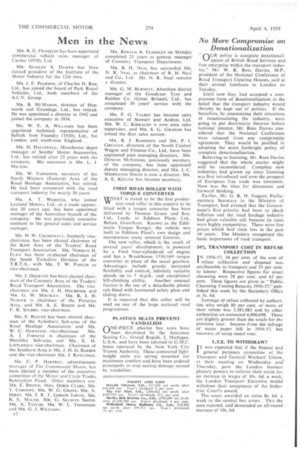No More Compromise on Denationalization
Page 40

If you've noticed an error in this article please click here to report it so we can fix it.
0"policy is complete denationalization of British Road Services and free enterprise within the transport industry," Mr. W. R. Rees Davies, M.P., president of the National Conference of Road Transport Clearing Houses, said at their annual luncheon in London on Tuesday.
Until now they had accepted a compromise form of denationalization in the belief that the transport industry would thereby be kept out of politics. If the Socialists, by announcing their intentions of renationalizing the industry, were going to put doctrinaire theories before national interest, Mr. Rees Davies considered that the National Conference were released from any compromise agreement. They would be justified in adopting the more forthright policy of complete denationalization.
Referring to licensing, Mr. Rees Davies suggested that the whole matter might well be reconsidered. Complete new industries had grown up since licensing was first introduced and now the prospect of European free trade was imminent. Now was the time for discussion and forward thinking.
Earlier, Mr. G. R. H. Nugent, Parliamentary Secretary to the Ministry of Transport, had stressed that the Government's first priority had been to check inflation and the road haulage industry had given valuable aid, because its rates were highly competitive. There were few prices which had risen less in the past 10 years. The Ministry recognized the basic importance of road transport.












































































































